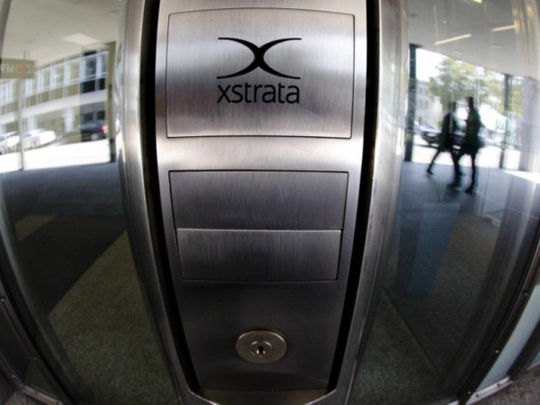
London: Glencore International Plc’s “merger of equals” with Xstrata Plc edged closer to being a fully fledged hostile takeover after Glencore Chief Executive Officer Ivan Glasenberg raised his bid by 9 per cent and demanded that he lead the new company rather than Xstrata CEO Mick Davis.
The dramatic and unforeseen developments in what would be this year’s biggest merger included an evening negotiating session in a London hotel mediated by former UK Prime Minister Tony Blair — between Glasenberg and Qatar’s prime minister, said a person with knowledge of the deal. Qatar’s sovereign wealth fund, which has been insisting on a higher price, holds a pivotal 12 per cent share in Xstrata.
Glencore’s move would shred the power-sharing agreement reached by both companies in February, when the then-$21.9 billion-pound ($35.1 billion) deal was announced. Davis was to have led the new company, and Glasenberg, Glencore’s largest shareholder with a stake worth $6.9 billion, would have been deputy CEO. Xstrata investors, told of the latest proposal as they were arriving at a meeting yesterday in Switzerland to vote on the deal, must now wait while the company seeks more detail from its suitor.
“Probably Ivan thought if it’s going to cost me so much money I want control,” said Peter Davey, head of metals and mining research at Standard Bank Group Ltd in London. “Davis not having the CEO post may upset Xstrata shareholders.”
Coal Exporter
Glencore trades commodities and owns mines, smelters and oil wells. Xstrata mines copper and is the world’s largest exporter of coal burned by power stations. Combining them would create the fourth-biggest mining company.
Glencore raised its offer to 3.05 shares for every one of Xstrata’s, from 2.8 shares previously, and proposed restructuring the transaction as a takeover offer. The revised bid, at a premium of 17.6 per cent, is “significantly lower than would be expected in a takeover,” Zug, Switzerland-based Xstrata said in a statement yesterday.
That’s less than the average announced premium of 30 per cent for all other mining deals valued at more than $5 billion since at least 1999, according to data compiled by Bloomberg.
Xstrata’s response “suggests that the board was given little notice of the change and it may view the move as a hostile takeover,” Tony Robson, an analyst at BMO Capital Markets in Toronto, said in a note. Xstrata’s senior managers may refuse to work for the merged company, he said.
Hotel Meeting
The deal is currently a so-called scheme of arrangement, meaning Baar, Switzerland-based Glencore can’t vote its 34 per cent Xstrata stake and investors holding 16.48 per cent can block the merger. Sovereign wealth fund Qatar Holding LLC, the second-biggest Xstrata investor with 12 per cent, said in June it was seeking a ratio of 3.25 Glencore shares.
Glasenberg, 55, met in a London hotel on the evening of September 6 with Qatar’s Prime Minister Sheikh Hamad Bin Jasim Bin Al-Thani, according to the person familiar with the deal who declined to be identified because the meeting was private.
While Qatar is broadly supportive of Glencore’s new terms for the takeover, it was unaware that Glencore would seek to drop the plan to install Davis as CEO of a merged group, according to two people with knowledge of the talks. Qatar doesn’t agree with the proposed change to the CEO role, said the people, who declined to be identified as the matter is confidential.
Marc Rich
Glasenberg and Davis’s relationship goes back to the 1970s. The two South Africans met at the University of Witwatersrand where Davis was a lecturer and Glasenberg a student. Both qualified as accountants, after which their paths temporarily diverged.
Glasenberg joined commodity trader Marc Rich & Co. in 1983. After a stint as a coal trader, he ran the company’s coal department. Management bought out founder Marc Rich in 1994 and renamed the company Glencore and Glasenberg became CEO in 2002.
Davis, 54, was hired in 1994 as finance director of South African miner Gencor Ltd, which eventually became part of BHP Billiton Ltd Davis left in 2001 to join Xstrata, which sold shares to investors in London the following year. Under his leadership, Xstrata increased its market value almost 100-fold to 30.5 billion pounds business with a staff of more than 70,000 in 20 countries.
“We would like to see greater visibility into the role proposed for Mick Davis,” said Paul Gait, an analyst at Sanford C. Bernstein. “He has played a crucial, driving role in Xstrata’s meteoric rise to date.”
‘Significant Risk’
Xstrata has sought to keep Davis and other senior managers following the completion of the deal. The original proposal included 172.8 million pounds of retention payments for Davis and 72 other managers. While investors including Standard Life Plc criticized the payments as excessive, Xstrata said they were necessary to retain employees overseeing a multibillion-dollar expansion of production.
Glencore’s proposal to replace Davis and amend incentives for Xstrata management poses a “significant risk around the retention of the Xstrata senior and operational management,” Xstrata said in its statement yesterday.
A Glencore spokesman declined to comment further. A Qatar Holding spokesman also declined to comment.
Xstrata gained 3.6 per cent on Friday to close at 1,014 pence in London trading. Glencore dropped 3.6 per cent to 378.05 pence. Xstrata stock traded at 2.68 times that of Glencore, up from a ratio of 2.5 the day before.










